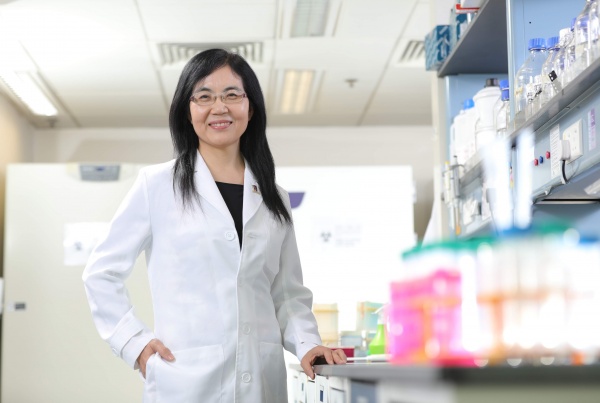Three top research academics from The Chinese University of Hong Kong (CUHK), were presented with the prestigious Senior Research Fellowship and Innovation Awards 2016 of The Croucher Foundation today (13 April), for their excellent scientific research achievements. Prof. Rossa Chiu, Choh Ming-Li Professor of Chemical Pathology and Assistant Dean (Research) at the Faculty of Medicine; and Prof. Jun Yu, Professor of the Department of Medicine and Therapeutics, Director of the Research Laboratory of Institute of Digestive Disease, and Associate Director of the State Key Laboratory of Digestive Disease; were awarded a Croucher Senior Medical Research Fellowship and a Croucher Senior Research Fellowship respectively. Prof. Jonathan Choi Chung-hang, Assistant Professor, Department of Electronic Engineering (Biomedical Engineering) received a Croucher Innovation Award. He is the first recipient from CUHK since the inauguration of this award in 2012. Officiated at the presentation ceremony was Prof. Rosie Young, GBS, JP.
Blood Test that Detects Cancer’s Location
Prof. Rossa Chiu is known for her contributions in the successful development of non-invasive prenatal testing for Down syndrome and other fetal diseases by maternal blood analysis. The clinical use of non-invasive prenatal testing for Down syndrome has since been implemented worldwide, reducing the chance of fetal miscarriage associated with conventional invasive prenatal diagnostic procedures, such as by amniocentesis.
Recently, Professor Chiu and her research team have achieved another breakthrough in blood based cancer detection. The latest approach, termed plasma DNA tissue mapping, is akin to performing a computerized tomography (CT) scan using blood samples. The new technology is not only able to detect abnormal DNA associated with cancer, it also locates which organ the abnormal DNA is coming from. For instance, it is able to identify that more abnormal DNA is coming from the liver in patients with liver cancer or, in expectant mothers, that a proportion of plasma DNA is coming from the placenta.
Since every cancer is very different, it is difficult to find a single marker targeting a specific type of cancer. Previously, when cancer symptoms were observed, after doing a blood test, the medical personnel would still have to do a radiological imaging examination to see if there were shadows in any parts of the body. Now, the latest blood test developed by Professor Chiu and her research team can map out normal and abnormal distribution of DNA and their locations. The ultimate goal of this research is to enable early cancer detection and treatment.
Professor Chiu has received a number of awards including the ‘14th World Outstanding Chinese Award’ (2015), ‘Science and Technology Award for Chinese Youth’ (2013), ‘Outstanding Scientific Achievements by a Young Investigator’ of the American Association of Clinical Chemistry (2013), and ‘APEC Science Prize for Innovation, Research and Education’ (2012). Further to her research achievements, Professor Chiu also excels in teaching. She won the annual Teaching Award from the Faculty of Medicine for five consecutive years from 1999 and was awarded the title of Master Teacher by the Faculty of Medicine at CUHK in 2005. As of today, Professor Chiu has published more than 140 peer-reviewed research articles and holds 150 patents or patent applications.
Pathogenetic Mechanisms of NAFLD
In the past 10 years, the prevalence of non-alcoholic fatty liver disease (NAFLD) has grown dramatically by between two to four times. NAFLD has a high prevalence of over 27% of the population in Hong Kong. According to clinical research, before a healthy liver turns into a liver cancer, it will progressively change into steatosis, non-alcoholic steatohepatitis (NASH) and fibrosis. 23% of patients with steatosis would have NASH or fibrosis within three years. Recently, Prof. Jun Yu and her research team have demonstrated some major discoveries in the pathogenetic mechanisms of NAFLD, which will comprehensively depict the molecular landscape of NAFLD by using unbiased systems biology approaches, thereby finding out the preventative and curative treatments.
Professor Yu joined the Department of Medicine and Therapeutics, CUHK in 2005. She was a post-doctoral fellow under Prof. Joseph Sung. Gastrointestinal cancers (stomach, colon, liver) constitute about 40% of all malignancies diagnosed in China and are the top killer in Hong Kong. Over the years, she has made new findings in the areas of gastrointestinal cancers in relation to the genomic and epigenomic molecular mechanisms, cancer biomarkers, cancer therapy, fatty liver disease and liver cancer. She has discovered over 10 new genes that suppress stomach cancer, and revealing for the first time the genomic and epigenomic alterations in EBV-associated stomach cancer by integrated genome sequencing. All these discoveries are crucial to understanding the pathogenetic mechanisms of stomach cancer. In recent years, the prevalence of colon cancer has increased greatly in Hong Kong. Professor Yu has discovered genes that facilitate and suppress colon cancer; discovered driver mutations for the implementation of personalized cancer therapy, the biclonal origin of colon cancer and survival associated mutation signature in colon cancer; pioneered the non-invasive diagnostic biomarkers for colon cancer. These findings open up a new class of molecular mechanisms and diagnosis for colon cancer pathogenesis.
Professor Yu’s contributions to the advancement of medical sciences have been recognized with many prestigious awards such as the Research Excellence Award CUHK (2010); First-class of the Ministry of Education (MOE) Higher Education Outstanding Scientific Research Output Awards (Natural science) (2010); First-class of MOE Higher Education Outstanding Scientific Research Output Awards (Scientific and Technological Progress Award) (2012); National Award for Science and Technology Progress 2012 (2012); First-class of MOE Higher Education Outstanding Scientific Research Output Awards (Natural science) (2014), and Outstanding Fellow of the Faculty of Medicine, CUHK (2015). Professor Yu has published over 280 publications in international peer-reviewed journals.
Guiding the Delivery of Nanoparticles by Elucidating ‘Bio-Nano’ Interactions
Prof. Jonathan Choi Chung-hang specializes in the interactions of nanoparticles with the body across the length scales of organ, tissue, cell, and organelle. His mechanistic research will inform useful ‘design rules’ for building more potent therapeutic nanoparticles. He previously reported novel ‘bio-nano’ interactions between nanoparticles and the kidney (Choi CHJ et al. PNAS, 2011), which will aid the development of new delivery strategies to the kidney. With this award, he hopes to design nanoparticles for detecting kidney diseases in vivo.
Professor Choi joined CUHK in 2013 as an assistant professor in the Department of Electronic Engineering. As a core member of the Biomedical Engineering Programme, his research interests lie in drug delivery, ‘bio-nano’ interactions, bionanomaterials, and biological imaging.
Born and raised in Hong Kong, Professor Choi completed his secondary school studies at Wah Yan College Hong Kong, scoring 10 distinctions in the HKCEE in 2000. He later moved to the U.S. and obtained his B.S. and M.S. degrees in chemical engineering from Stanford University in 2005 and 2006, respectively. In 2011, he received his Ph.D. degree in chemical engineering from the California Institute of Technology. For his dissertation, he established important design rules for delivering nanoparticles to the tumor and kidney mesangium in vivo. From 2011 to 2013, he worked as a Croucher postdoctoral fellow at Northwestern University, where he studied how bionanomaterials enter and subsequently traffic inside the cell.
The Croucher Senior Research Fellowships/ Croucher Senior Medical Research Fellowships
The Croucher Senior Research Fellowships scheme was first introduced in 1997. The value of the awards are about HKD900,000 for the Senior Research Fellowship and HKD1,000,000 for the Senior Medical Research Fellowship, each includes a personal grant of HKD60,000 to the recipient for research expenses. It is awarded to local academics who have excelled in scientific research work as judged by leading international scientists invited to provide confidential reviews of candidates nominated in a competitive exercise. Funds are awarded to the universities of the fellowship recipients, enabling the university to recruit replacement teachers to take over the award winner’s duties for the period of the fellowship. This enables the awardees to devote more time and effort to research work.
The Croucher Innovation Awards
Established in 2012, the Croucher Innovation Awards aim to identify a small number of exceptionally talented scientists working at an internationally competitive level and to offer substantial support to these ‘rising stars’ at a formative stage in their careers. The scheme is designed to enable recipients to pursue their own scientific, intellectual and professional inclinations, to advance their expertise, to engage in bold new work, and to contribute to the development of education and research in Hong Kong. Each award carries a value of up to HK$5 million over 5 years.
A total of 23 scholars from CUHK have been awarded the Croucher Senior Research Fellowships since its inception. They are: Prof. Henry WONG Nai-ching, Prof. WU Chi, Prof. XIE Zuowei, Prof. CHOW Hak-fun and Prof. Tony SHING Kung-ming of Chemistry, Prof. Raymond YEUNG Wai-ho of Information Engineering, Prof. WEI Juncheng of Mathematics, Prof. XIA Keqing and Prof. Emily CHING Shuk-chi of Physics, Prof. HUANG Jie of Mechanical and Automation Engineering, Prof. CHAN Hsiao-chang and Prof. HUANG Yu of Biomedical Sciences, Prof. Michael LYU Rung-tsong and Prof. John LUI Chi-shing of Computer Science and Engineering, Prof. JIANG Liwen of Life Sciences, and Prof. YU Jun of Medicine and Therapeutics. Among them, seven scholars have been awarded the Croucher Senior Medical Research Fellowship. They are: Prof. Joseph SUNG Jao-yiu, Vice-Chancellor, Prof. Jean WOO, Prof. Francis CHAN Ka-leung, Prof. Henry CHAN Lik-yuen and Prof. Lawrence WONG Ka-sing of Medicine and Therapeutics, Prof. Dennis LO Yuk-ming and Prof. Rossa CHIU of Chemical Pathology, as well as Prof. James LAU Yun-wong of Surgery.
This year, Prof. Jonathan CHOI Chung-hang of Electronic Engineering (Biomedical Engineering) is the first recipient of the Croucher Innovation Award from CUHK.
Prof Rosie Young presents the award of Croucher Senior Medical Research Fellowship to Prof Rossa Chiu.
Prof Rosie Young presents the award of Senior Research Fellowship to Prof Jun Yu.
Prof Rosie Young presents the Innovation Award to Prof Jonathan Choi.
Prof. Rosie YOUNG (front row) poses for a group photo with CUHK members. (From left, back row) Prof. TSANG Hon-ki, Chairman of the Department of Electronic Engineering; Prof. Kenneth YOUNG, Master of C.W. Chu College; Prof. HUANG Yu, Professor of the School of Biomedical Sciences; Prof. Jonathan CHOI, recipient of Croucher Innovation Award 2016; Prof. Rossa CHIU, recipient of Croucher Senior Medical Research Fellowship 2016; Prof. Joseph SUNG, Vice-Chancellor and President of CUHK; Prof. Jun YU, recipient of Croucher Senior Research Fellowship 2016; Prof. Dennis LO, Associate Dean (Research) of the Faculty of Medicine; Prof. Henry WONG, Dean of the Faculty of Science; and Prof. Arthur MAK, Professor, Department of Mechanical and Automation Engineering.
Prof. Rossa Chiu (left) and Prof Jun Yu
Prof. Rossa Chiu
Prof. Jun Yu
In the News
14 April 2016
13 April 2016













